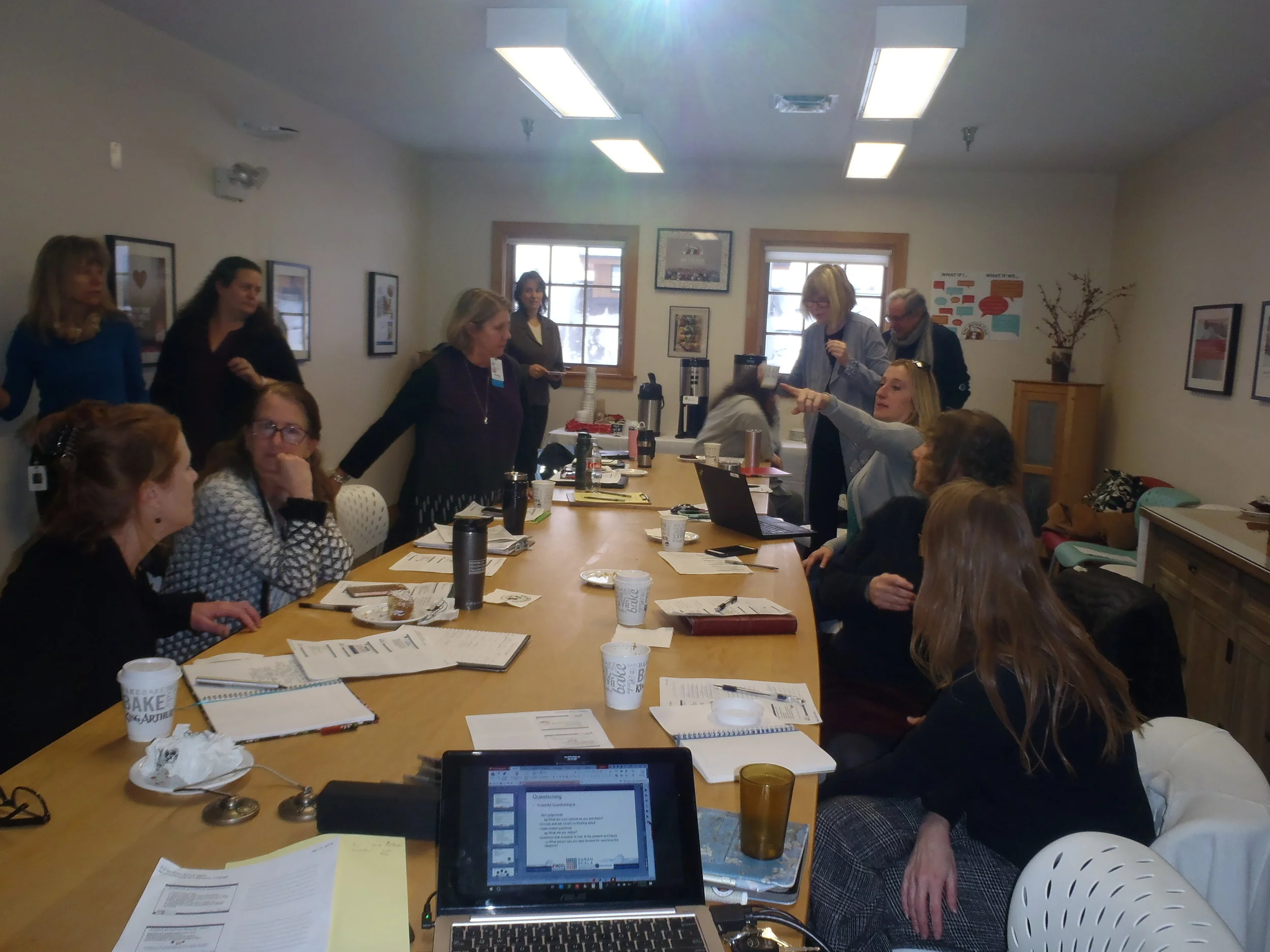Question and Answer: Neuro Coaching: Granite State Learning and Development Round Table.
Last week I led a workshop on Neuro Coaching and Behavior Change for the Granite State Learning and Organization Development Round Table, hosted by King Arthur Flour. Participation was strong, with great discussion and questions about using Compassion and Compliance coaching approaches in organizations.
Granite State Organization Development and Learning Round Table - Jan 2019
As I have written about on past blogs on coaching, learning how coaching impacts the brain fascinates me!
Questions that came up in the workshop included:
1. What is the difference between Level 2 and Level 3 listening?
Level 2 listening focuses on the other person, not our own thoughts. This is the “Listening to YOU” level. Level 3 listening is similar to Level 2, and also includes a bigger context to our listening, identifying how we are experiencing the coachee’s energy, and if we are detecting issues larger than what is being said. This involves listening beyond the words.
2. How do we know when we might cross the line between coaching and therapy?
This is an important line not to cross as a coach, unless you are also qualified to do so as a therapist. I know we are at the line when the client shares about symptoms including depression, anxiety, or things that have happened in their personal life in the past. In coaching, one does not focus on symptoms or draw conclusions. Therapists focus on the “why” patterns occur, while coaches focus on the “how”. Coaching is more present and future-focused.
3. How can we give developmental feedback or 360 Degree Assessment results and still activate the Positive Emotional Attractor (PEA) more than the Negative Emotional Attractor (NEA) when we coach?
According to Dr. Richard Boyatzis and Dr. Anthony Jack of Case Western Reserve University, feedback can activate the Positive Emotional Attractor (PEA), and it is best to focus on the coachee’s vision and dreams to create a positive context. The more we can focus on the strengths vs. the gaps or weaknesses in the context of their vision and dreams, the more likely they will not respond emotionally or physiologically in a defensive stance. (Boyatzis and Jack, 2018)
4. When you coach, do you give advice or just listen and ask questions?
Depending on the context, I mostly ask questions and listen to build self-awareness with my clients. There are times where I may give tips or advice when the client is in danger (i.e., Recommend EAP or a referral to a mental health provider, or when I am career coaching and I both ask and advise depending on the client’s needs).
Learn more by checking out our short video clips on our YouTube playlist on Neuro Coaching
What questions do you have about the brain and coaching? Please share in the comments. If you have specific questions, ask me. I'm happy to help.
My blogs and case study on Compassion vs Compliance coaching:
Blog: Compassion vs Compliance Coaching to Bring Sustained Business Change
Case Study: Executive Coaching for Marketing Leader making Big Strides
Questions? Let’s connect. I would love to hear your success stories. Please send them to: hello@sarahscala.com or visit www.sarahscala.com
Download my FREE Whitepaper on the Brain and Coaching
Sign up for our Newsletter for great articles, tools, and top blog posts
About the Author:
Sarah Scala is a senior talent management leader and executive coach with 20+ years of experience providing organization development, change management, and leadership development solutions for diverse global and local industries. She is a collaborative consultant, coach, and educator supporting performance transformation of executives, leaders, and teams. Sarah is a methodical, results-driven leader recognized for helping clients reach their highest potential, increase revenue, reduce turnover, elevate business profitability, build competencies, and improve performance.
Privacy policy: I do not rent, sell, trade or share your email address with anyone, ever.
©Sarah A Scala Consulting
All rights reserved. Excerpts and links may be used, provided that full and clear credit is given to Sarah A. Scala Consulting with appropriate and specific direction to the original content.


